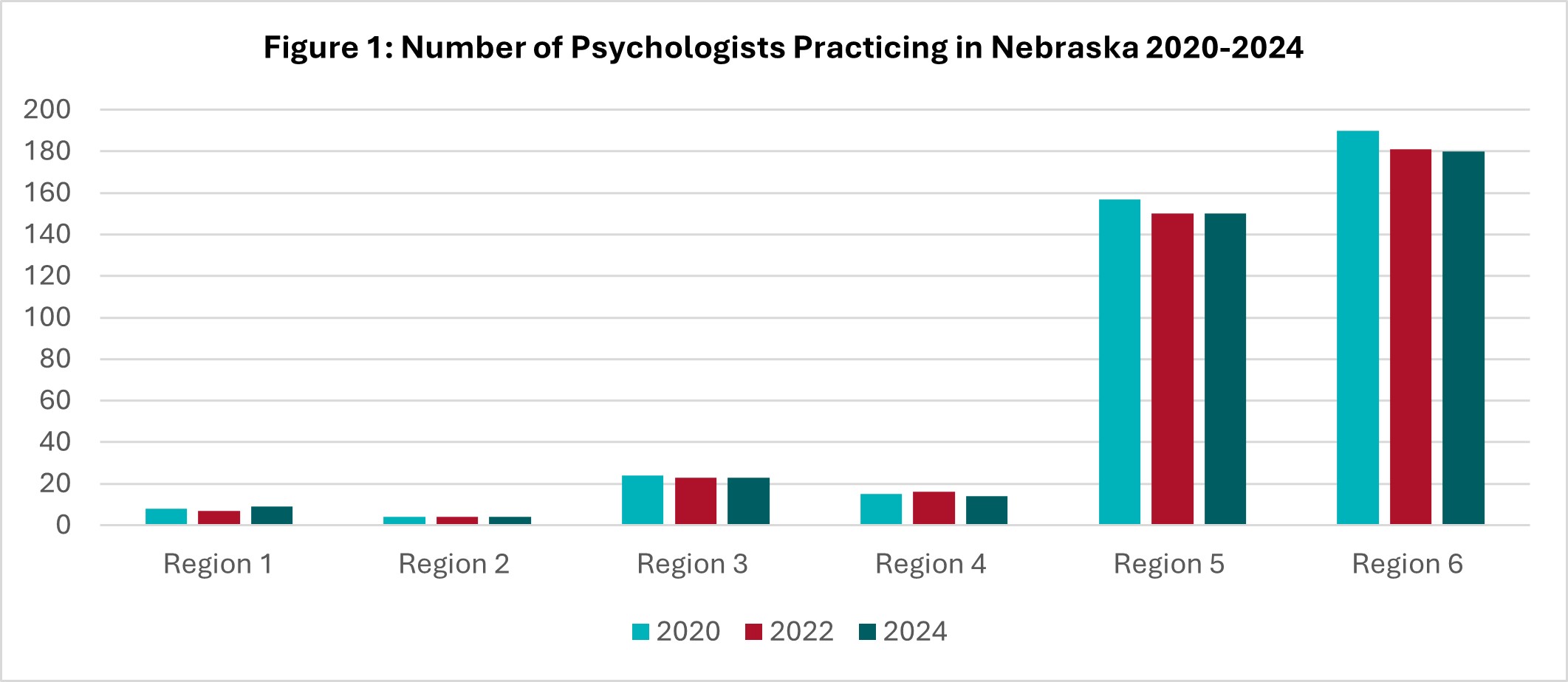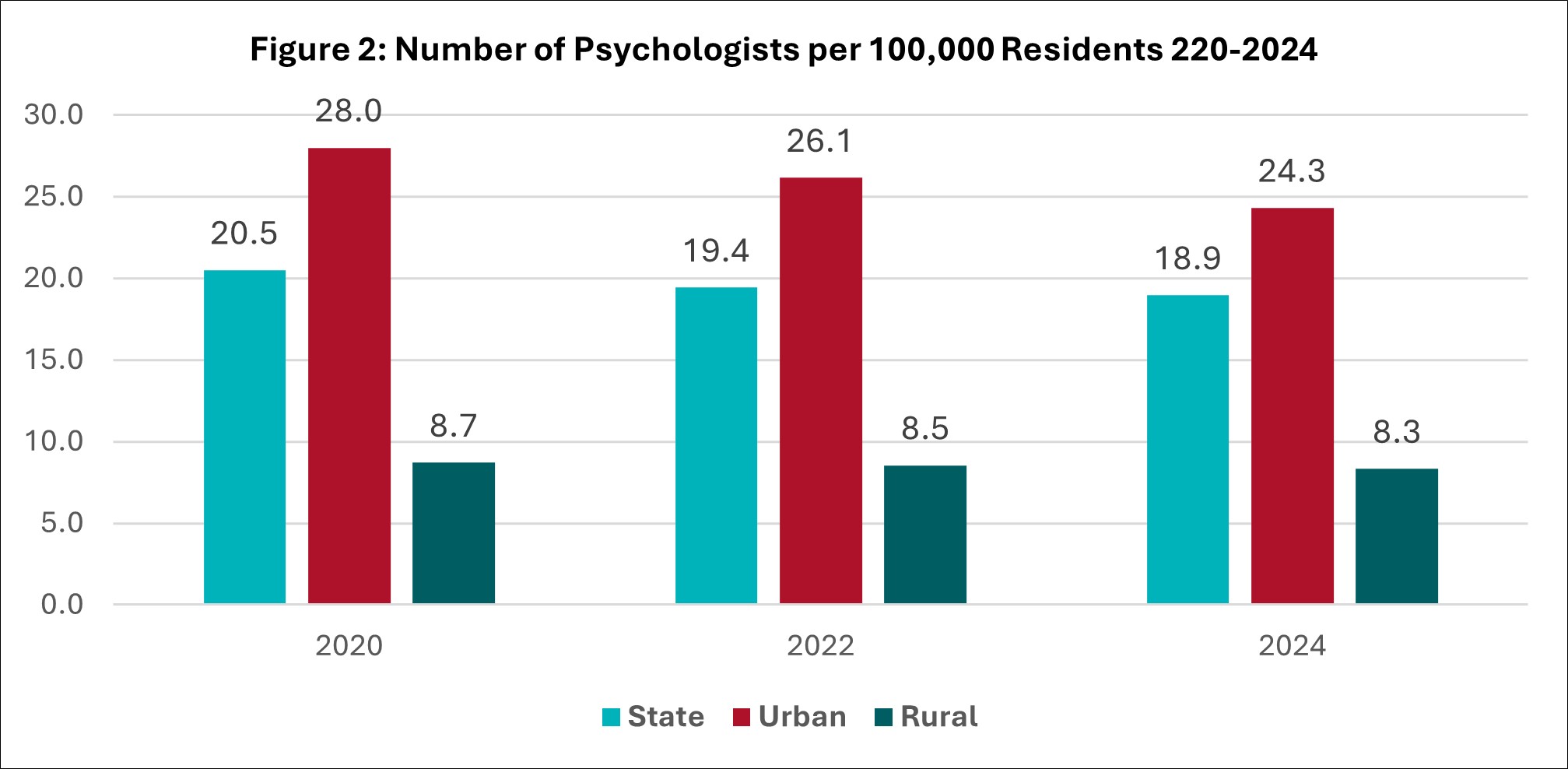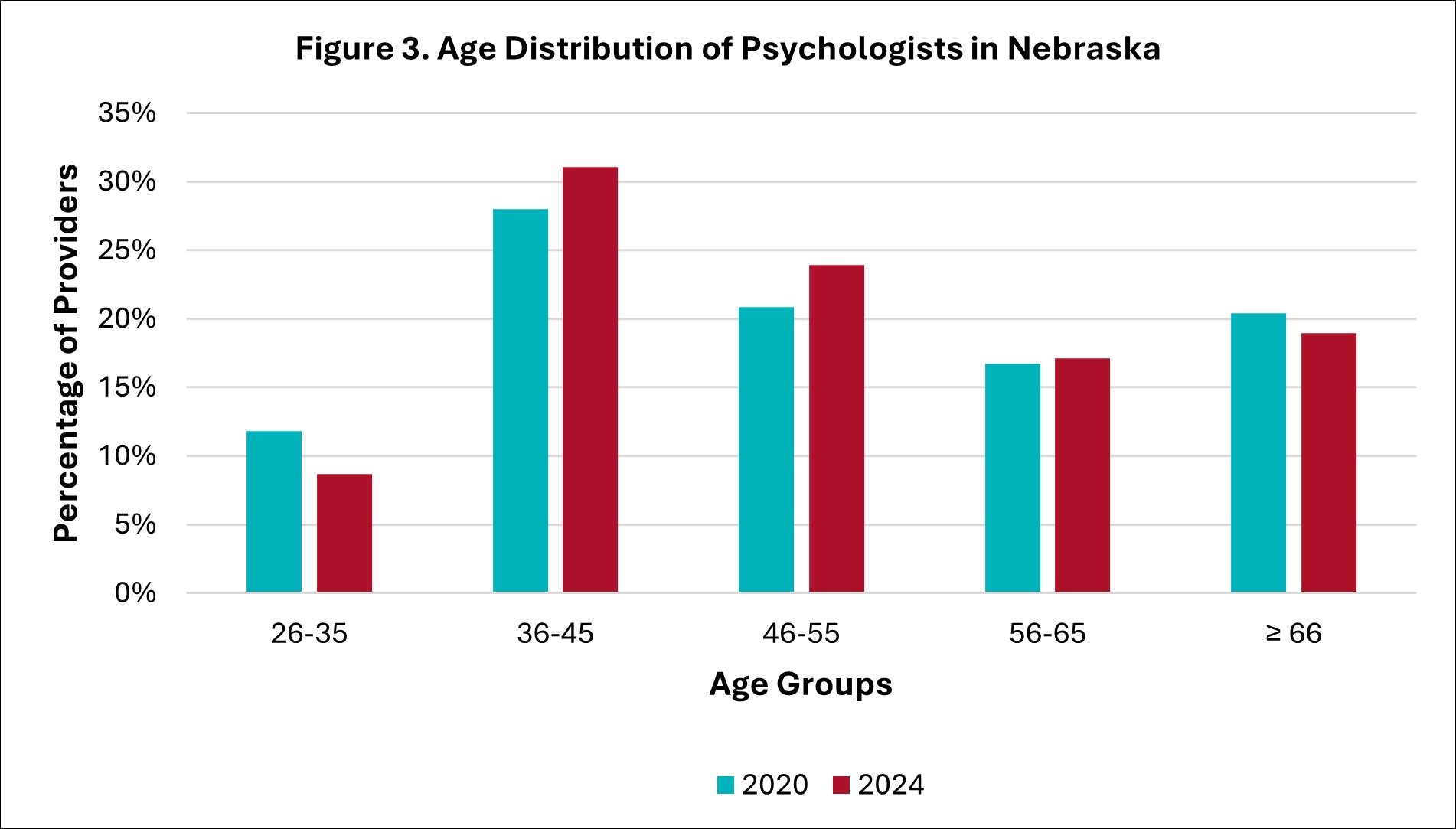The Psychology Workforce in Nebraska: 2020 to 2024
Purpose
BHECN utilizes data from the UNMC Health Professions Tracking Service to determine the number and type of licensed behavioral health professionals who practice in Nebraska. This data snapshot includes information about the licensed psychology workforce from 2020 to 2024. Only psychologists licensed through the Department of Health & Human Services are included here.
A licensed psychologist is an independently licensed behavioral health professional who performs psychological assessments, provides therapy, and conducts research on mental health disorders. Licensed psychologists require a doctoral degree in an applied area of psychology, such as clinical, school, or counseling psychology.
Key Findings
- After steadily increasing for 10 years, the number of psychologists in Nebraska decreased 5% between 2020 and 2024.
- Although there is a shortage of psychologists across the state, the shortage is especially pronounced in rural areas.
- There is only one university in Nebraska that offers doctoral programs in school, clinical and counseling psychology, and there are limited internships and post-doctoral supervision positions.
Regional Trends
The number of licensed psychologists practicing in Nebraska increased 25% from 318 in 2010 to 398 in 2020, but then decreased 5% from 2020 to 2024 (from 398 to 380). From 2020 to 2024, the number of psychologists increased in Nebraska Behavioral Health Region 1, remained stable in Region 2, and decreased in Regions 3-6 (see Figure 1).[1]

Rural and Urban Distribution of Psychologists
The number of psychologists per 100,000 population decreased in both rural and urban areas of Nebraska from 2020 to 2024 (see Figure 2). The availability of psychologists is over twice as high in urban areas compared to rural areas of the state. Further, the number of psychologists in Nebraska is below the national average of 30 providers per 100,000 population in both rural and urban areas.[2]

Age of Psychologists
Since 2020, the number of psychologists at or nearing retirement age has decreased slightly, and the number of psychologists aged 36-55 has increased (see Figure 3).

Psychology Training Programs
Psychology requires the second-most years of education (behind psychiatry) for licensure in the state of Nebraska. The average length of training for psychologists is 10+ years: 4 years to complete a Bachelor’s degree; 5 years to earn a doctoral degree, including a 1-year internship; and another year of post-doctoral supervised experience while holding a provisional license. There are three American Psychological Association (APA) accredited doctoral psychology programs in Nebraska, all at the University of Nebraska-Lincoln (School, Clinical, and Counseling Psychology).
There are also four APA-accredited internship programs in Nebraska. The Nebraska Internship Consortium in Professional Psychology (NICPP) is the largest psychology internship program in the state. The NICPP comprises eight agencies: Boys Town, Immaculate Heart of Mary Counseling Center, Morningstar Counseling and Consultation, Munroe-Meyer Institute, Nebraska Department of Health and Human Services, QLI, and University of Nebraska Lincoln Counseling and Psychological Services. The number of NICPP internship applicants (212 in 2024) far exceeds the number of internships (approximately 41 per year).
The Nebraska Mental Health Centers Psychology Internship Program offers up to 3 internships per year. Interns work in Lincoln and at satellite locations in Wahoo and Beatrice. The VA Nebraska-Western Iowa Health Care System Doctoral Internship in Clinical Psychology offers up to 6 internships per year (2 at the Grand Island VA, one at the Lincoln VA, one at the Norfolk Community-Based Outpatient Clinic, and two at the Omaha VA). The High Plains Psychology Internship Consortium, based in Colorado, also offers internships at Options in Psychology, LLC, in Nebraska.
Findings from BHECN’s Nebraska Health Workforce Partnership (NEBWP) 2025 Summit[3] indicate that after graduation, provisionally licensed providers and their supervisors need additional financial support to address supervision, licensing, and credentialing challenges.
Conclusions
After steadily increasing for 10 years, the number of psychologists in Nebraska decreased 5% between 2020 and 2024. Although the number of psychologists per 100,000 residents is lower than the national average in all areas, the shortage of psychologists is especially pronounced in rural areas. There is only one university in Nebraska that offers APA-accredited doctoral programs in school, clinical, and counseling psychology. There are also several known challenges in Nebraska that prevent substantial increases in the psychology workforce, including a shortage of internships and supervised post-doctoral positions.
Suggested citation:
Behavioral Health Education Center of Nebraska. (2025). The Psychology Workforce in Nebraska: 2020 to 2024. https://www.unmc.edu/bhecn/research-data-policy/2020_2024_psychologist_snapshot.html
Footnotes
[1] Nebraska Department of Health and Human Services. (2025). Behavioral Health Resources for Schools: Division of Behavioral Health. https://dhhs.ne.gov/BHSchoolResources/AboutDBH.pdf
[2] National Center for Health Workforce Analysis. (2024). State of the Behavioral Health Workforce, 2024. https://bhw.hrsa.gov/sites/default/files/bureau-health-workforce/state-of-the-behavioral-health-workforce-report-2024.pdf
[3] BHECN (2025). Nebraska Behavioral Health Workforce Partnership Summit 2025 Report.